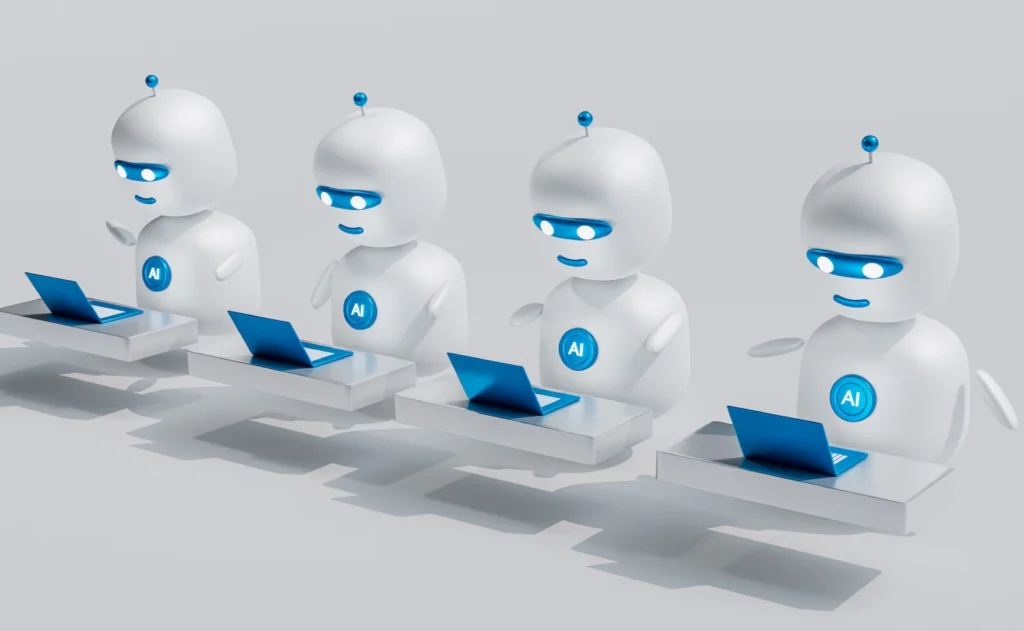In this guide, we’ll discuss how AI chatbot technology, powered by artificial intelligence, is reshaping customer service and revolutionizing businesses worldwide. Discover how virtual assistants equipped with natural language processing and machine learning capabilities are transforming the way businesses interact with their customers. From automated customer service to intelligent chatbot solutions, we’ll delve into the advancements in chatbot development.
The Role of AI Chatbots in Customer Service
In today’s fast-paced business world, providing exceptional customer service is essential. This involves being available to customers around the clock, responding quickly to inquiries, and always providing accurate information. But how can businesses achieve these goals while still managing their resources efficiently?
Enter AI chatbots – automated virtual assistants powered by artificial intelligence. These chatbots are revolutionizing customer service by providing quick and personalized assistance to customers in real-time, without the need for human intervention.
What are AI Chatbots?
AI chatbots are virtual assistants that are designed to simulate human conversation. These chatbots leverage natural language processing and machine learning algorithms to understand user queries and provide accurate responses. They can be integrated into various communication channels, such as websites, mobile apps, and social media platforms, making them easily accessible to customers.
The Benefits of AI Chatbots in Customer Service
Deploying AI chatbots for customer service offers several benefits to businesses, such as:
- 24/7 availability: AI chatbots can provide round-the-clock support to customers, ensuring that they can get assistance whenever they need it.
- Improved response times: AI chatbots can respond to customer inquiries instantly, providing immediate resolution to their problems.
- Increased efficiency: By handling routine inquiries, AI chatbots can free up human agents to focus on more complex tasks, improving their productivity.
- Cost savings: AI chatbots are more cost-effective than hiring and training agents, resulting in significant cost savings for businesses.

The Future of AI Chatbots in Customer Service
As chatbot technology continues to evolve, so do its capabilities. The future of AI chatbots in customer service includes:
- Voice-based AI chatbots: With the increasing popularity of virtual assistants like Siri and Alexa, businesses are exploring voice-based AI chatbots to provide a more natural and intuitive customer experience.
- Multi-language support: AI chatbots are becoming more proficient in understanding and responding to queries in different languages, making them ideal for global businesses.
- Personalization: AI chatbots are being designed to provide personalized recommendations and solutions to customers, based on their behavior and preferences.
It’s clear that AI chatbots are transforming customer service and revolutionizing business operations. By leveraging chatbot technology, businesses can provide exceptional customer experiences, drive growth, and stay ahead of the competition.
Understanding AI Chatbot Technology
In this section, we will delve into the underlying technology behind AI chatbots. The development of AI chatbots is made possible through a combination of chatbot technology, natural language processing, and machine learning.
Natural Language Processing (NLP) is a subfield of AI that is concerned with the interaction between computers and humans in natural language. It is the process by which AI chatbots can understand and interpret human language.
Machine learning is a type of AI that enables chatbots to learn from data, recognizing patterns and making decisions based on that data. Through machine learning, AI chatbots can become more accurate and effective over time.
Natural Language Processing (NLP)
NLP enables AI chatbots to analyze and interpret human language, allowing them to process and respond to user queries more effectively. Through NLP, chatbots can identify the intent of a user’s query, enabling them to provide accurate and relevant responses. NLP is also essential for chatbots that need to understand multiple languages or dialects.
There are several components to NLP, including:
- Tokenization: Breaking down text into individual words or phrases.
- Part-of-speech tagging: Identifying the parts of speech of each token, such as nouns, verbs, and adjectives.
- Named entity recognition: Identifying named entities, such as people, places, and organizations, within text.
- Sentiment analysis: Analyzing the tone and sentiment of text to understand the writer’s feelings or opinions.
Machine Learning
Machine learning enables AI chatbots to learn from data, making them more accurate and effective over time. This is especially important for chatbots that handle large volumes of user queries and must be able to adapt to new information.
There are two types of machine learning: supervised learning and unsupervised learning. Supervised learning involves training chatbots on a labeled dataset, where the correct answer is known. The chatbot can then use this data to learn how to respond to new queries. Unsupervised learning involves training chatbots on an unlabeled dataset, allowing them to identify patterns and relationships within the data on their own.
By combining NLP and machine learning, AI chatbots can interpret and respond to human queries in a more human-like manner, providing a more engaging and personalized user experience.

The Benefits of Virtual Assistants in Business
In today’s fast-paced business world, time is money. That’s why virtual assistants, powered by AI chatbots and chatbot technology, are becoming an increasingly popular solution for businesses looking to improve efficiency, reduce costs, and enhance customer satisfaction.
Virtual assistants, also known as AI chatbots, are computer programs designed to interact with humans through natural language processing and machine learning capabilities. By understanding human language and context, virtual assistants can provide automated customer service solutions, assist in completing tasks, and offer personalized recommendations to customers.
The advantages of using virtual assistants in business go beyond basic automation. By providing 24/7 availability and almost instant response times, virtual assistants can improve customer satisfaction by ensuring customer inquiries and issues are addressed promptly. Additionally, by automating repetitive tasks, businesses can free up employees to focus on higher level tasks and improve overall productivity.
Automated customer service through virtual assistants can also help to reduce costs, as fewer human representatives are required to handle inquiries. This can lead to significant savings for businesses, especially those with high customer service demands.
| Benefits of Virtual Assistants in Business | |
|---|---|
| 24/7 Availability | Virtual assistants can provide customer service solutions around the clock, improving customer satisfaction and response times. |
| Automation of Repetitive Tasks | Virtual assistants can handle simple, repetitive tasks, freeing up employees to focus on higher level tasks and increasing productivity. |
| Improved Customer Satisfaction | By providing instant responses to inquiries and issues, virtual assistants can improve customer satisfaction and loyalty. |
| Cost Savings | By reducing the need for additional human representatives, virtual assistants can help to reduce costs for businesses, especially those with high customer service demands. |
The Future of Virtual Assistants in Business
The future of virtual assistants in business is bright, with advancements in AI chatbot technology and new capabilities being developed all the time. Virtual assistants will continue to improve and provide increasingly personalized and seamless interactions, offering businesses even greater opportunities to enhance customer satisfaction and drive growth.
In the coming years, we can expect to see virtual assistants with voice-based capabilities, allowing for even more natural and conversational interactions with customers. Additionally, multi-language support will become more common, making virtual assistants more accessible to a wider global audience.
As virtual assistants become more sophisticated and their capabilities continue to evolve, it’s clear that they will play a significant role in the future of businesses of all kinds.
Enhancing Customer Experience with Intelligent Chatbot Solutions
In today’s competitive business landscape, delivering exceptional customer experiences has never been more critical. As AI chatbots continue to gain popularity, businesses are beginning to understand the importance of integrating intelligent chatbot solutions to provide personalized and engaging experiences for their customers.
The Power of Intelligent Chatbot Solutions
Intelligent chatbot solutions, powered by artificial intelligence, are transforming the way businesses interact with their customers. By leveraging machine learning and natural language processing, AI chatbots can understand and respond to human queries in a more human-like manner. As a result, businesses can provide personalized interactions, targeted recommendations, and seamless customer support.
Intelligent chatbot solutions can be applied across a variety of industries, including retail, healthcare, and banking. For example, in the retail industry, chatbots can provide customers with personalized product recommendations based on their browsing history and purchase behavior. In healthcare, chatbots can assist patients with scheduling appointments and provide basic medical advice. In banking, chatbots can answer customer inquiries about accounts and transactions.
The Benefits of Intelligent Chatbot Solutions
Intelligent chatbot solutions offer a wide range of benefits for businesses, including:
- 24/7 Availability: Chatbots can provide round-the-clock customer support, ensuring that customers can access the help they need whenever they need it.
- Improved Efficiency: With chatbots handling routine inquiries, businesses can free up customer service representatives to focus on more complex issues, improving overall efficiency.
- Increased Personalization: Chatbots can analyze customer data to provide personalized recommendations and tailored interactions, improving the overall customer experience.
- Cost Savings: By automating routine tasks, chatbots can reduce labor costs and improve the bottom line.
Best Practices for Implementing Intelligent Chatbot Solutions
Integrating intelligent chatbot solutions into your business requires careful planning and execution. Here are some best practices to keep in mind:
- Define Clear Objectives: Identify the specific business goals that chatbots will help you achieve, such as increasing customer satisfaction or reducing support costs.
- Select the Right Platform: Choose a chatbot platform that aligns with your business needs and budget.
- Train Your Chatbot: Provide your chatbot with training data to improve its natural language processing and machine learning capabilities, ensuring it can accurately understand and respond to customer inquiries.
- Manage User Expectations: Be transparent about what your chatbot can and cannot do. Set realistic expectations for customers to avoid frustration and disappointment.
- Monitor Performance: Continuously monitor and analyze your chatbot’s performance to identify gaps and areas for improvement.
Integrating intelligent chatbot solutions into your business can help you provide personalized and engaging experiences for your customers, improve efficiency, and reduce costs. By following best practices and leveraging the power of chatbot technology, businesses can stay ahead of the competition and drive long-term growth.

The Evolution of Chatbot Development
At the heart of AI chatbots is the technology that powers them. As chatbots become more sophisticated, the underlying technology must evolve to keep pace with the demands of businesses and consumers. We will explore the latest advancements in chatbot development, from machine learning to conversational AI, and how they have transformed the capabilities and potential of AI chatbots.
Machine Learning
Machine learning, a subset of AI, plays a crucial role in chatbot development. With machine learning algorithms, chatbots can learn and adapt to user behavior over time, providing more personalized and accurate responses. Through supervised and unsupervised learning, chatbots can recognize patterns in user interactions and improve their performance accordingly. As machine learning continues to advance, chatbots will become even more intelligent and capable of handling complex conversations.
Conversational AI
Conversational AI is a crucial area of chatbot development that focuses on making chatbots more human-like in their interactions. Through natural language processing and deep learning algorithms, chatbots can understand and respond to user queries in a more conversational and intuitive manner. This technology allows chatbots to recognize not only the words spoken but also the tone and intent behind them, making conversations more natural and engaging. With the advancements in conversational AI, chatbots will be able to handle complex queries and deliver even more sophisticated customer experiences.
| Advancements in Chatbot Development | Benefits |
|---|---|
| Improved machine learning algorithms | Personalized responses and accurate performance |
| Conversational AI | Human-like interactions and more engaging conversations |
The evolution of chatbot development has transformed AI chatbots from simple question-answering systems to sophisticated virtual assistants that can address complex business challenges. As chatbot technology continues to advance, we can expect to see more businesses leveraging the power of AI chatbots to improve customer experiences, streamline operations, and drive growth.
Overcoming Challenges in AI Chatbot Deployment
As with any new technology, deploying AI chatbots comes with its own set of challenges. However, with careful planning and implementation, businesses can overcome these challenges and reap the benefits of chatbot technology. Here are some of the key deployment challenges we’ve identified:
- Technical limitations: Developing and deploying AI chatbots requires technical expertise in areas such as natural language processing and machine learning. Businesses may need to invest in additional resources or hire third-party developers to ensure successful chatbot deployment.
- Data privacy: AI chatbots require access to sensitive customer data to personalize interactions and provide relevant recommendations. It’s essential to ensure that data privacy regulations are adhered to and customer data is secured at all times.
- User acceptance: Chatbots can’t fully replace human interactions, and some users may be resistant to interacting with chatbots. It’s important to manage user expectations and provide clear guidelines for when chatbots should be used, and when a human touch is necessary.
- Integration with existing systems: For chatbots to be effective, they need to integrate seamlessly with existing customer support systems. This requires careful planning and coordination with IT teams to ensure a smooth deployment process.
- Continuous improvement: AI chatbots require ongoing training and improvement to ensure they continue to deliver value over time. Businesses must establish a process for monitoring chatbot performance and making necessary adjustments to optimize results.
Deploying AI chatbots can be a complex process, but with careful planning and execution, businesses can overcome these challenges and harness the power of chatbot technology to improve customer interactions and drive growth.
Future Trends in AI Chatbots
In this section, we’ll explore the future trends in AI chatbot technology, which are powering the revolution in customer service. At present, AI chatbots are already being used to automate customer support and provide personalized recommendations to customers. However, the potential of AI chatbots is far-reaching, and we’re only beginning to scratch the surface of what they can do.
Voice-Based AI Chatbots
Voice-based AI chatbots are already making waves, and this trend is set to continue in the years ahead. These chatbots are capable of interpreting human speech and responding accordingly, providing a more natural and intuitive chatbot experience for customers. With the increasing popularity of voice-activated devices like Amazon Echo, Google Home, and Apple’s Siri, voice-based chatbots are set to become a standard feature in many businesses.
Multi-Language Support
As businesses expand globally, the need for multi-language support is becoming increasingly important. AI chatbots are already being used to provide instant translations and support in multiple languages, and this trend is set to continue as businesses seek to engage with customers in their local languages. With the ability to understand and respond to queries in multiple languages, multi-language chatbots are poised to revolutionize the way businesses communicate with customers around the world.
Customizable Personalities
Customizable personalities are another exciting trend in AI chatbot technology. With the ability to create chatbots with distinct personalities, businesses can provide a more engaging and memorable experience for customers. These chatbots can be tailored to match a brand’s style and tone, making them an effective tool for building brand awareness and strengthening customer loyalty.
Integration with Other Technologies
Finally, AI chatbots are set to become more integrated with other technologies, such as augmented reality and virtual reality. By combining these technologies with chatbot technology, businesses can create immersive and interactive experiences for customers, further enhancing the customer experience.
As AI chatbot technology continues to evolve, businesses must stay abreast of these trends to remain competitive. By embracing these new technologies, businesses can unlock new opportunities for growth and provide a more engaging and personalized experience for their customers.

The Impact of AI Chatbots on Business Growth
By leveraging AI chatbots, businesses can drive innovation and growth while providing efficient and personalized customer experiences. With chatbot technology improving every day, it’s no wonder that experts predict the global chatbot market will reach $9.4 billion by 2024. Let’s explore the benefits of AI chatbots for business growth.
Increased Efficiency and Cost Savings
AI chatbots can handle customer queries instantly and accurately, enabling businesses to provide 24/7 support without the need for additional staff. This not only reduces response times but also frees up resources, allowing staff to focus on more complex tasks. Additionally, chatbots can automate routine tasks such as appointment scheduling, invoice generation, and order tracking, resulting in cost savings and increased efficiency.
Improved Customer Satisfaction
Chatbots equipped with natural language processing and machine learning capabilities can understand and respond to customer queries in a conversational manner, providing a more human-like interaction. This personalized experience can improve customer satisfaction and loyalty, leading to increased retention rates and positive word-of-mouth advertising.
Increased Revenue and Sales
AI chatbots can provide targeted recommendations and promotions based on customer data analysis, leading to increased sales and revenue. Additionally, chatbots can assist with lead generation and follow-up, resulting in more potential customers and higher conversion rates.
Enhanced Data Collection and Analysis
AI chatbots can collect and analyze customer data, providing businesses with valuable insights into their customers’ behaviors and preferences. This information can be used to improve products, services, and marketing strategies, resulting in better business decisions and increased growth.
Competitive Advantage
By embracing AI chatbots, businesses can stay ahead of the competition and differentiate themselves in the marketplace. With chatbots becoming increasingly popular among consumers, not having one can put a business at a disadvantage. Implementing chatbot technology can help businesses stand out, attract new customers, and gain a competitive edge.
Best Practices for AI Chatbot Implementation
When implementing AI chatbots, it is important to consider best practices to ensure a successful deployment. Here are some key considerations:
Define Clear Objectives
Before selecting an AI chatbot platform, it’s crucial to define clear objectives for its implementation. Establishing goals such as reducing response times, improving customer satisfaction, or increasing sales can help guide the chatbot’s development and customization to fit specific business needs.
Select the Right Chatbot Platform
Choosing the right chatbot platform is essential for the chatbot’s successful implementation. Consider factors such as the platform’s scalability, ease of integration, customizability, and security features. It’s also important to select a platform with robust natural language processing and machine learning capabilities to enable the chatbot to understand and respond to human queries more accurately and efficiently.
Train Chatbots Effectively
Training chatbots is crucial for their ability to learn and adapt to customer interactions over time. It is essential to provide chatbots with sufficient training data and to continually monitor and evaluate their performance to identify areas of improvement. Additionally, incorporating human oversight and intervention can help ensure the chatbot’s responses align with the company’s values and customer needs.
Manage User Expectations
Managing user expectations is essential for a successful chatbot implementation. Communicate clearly with customers about the chatbot’s capabilities, limitations, and purpose. Setting realistic expectations can help build trust with customers and prevent dissatisfaction or confusion.
Continuously Improve Chatbot Performance
Regularly evaluating and refining chatbot performance is crucial for ensuring its effectiveness and maintaining customer satisfaction. Monitor customer feedback and track chatbot metrics to identify areas of improvement and implement necessary changes. Additionally, incorporating feedback from chatbot users and customer service representatives can provide valuable insights into the chatbot’s performance and identify areas for improvement.
By following these best practices, businesses can implement AI chatbots effectively and reap the benefits of improved customer interactions and increased efficiency.

Conclusion
In conclusion, AI chatbots powered by artificial intelligence technology are transforming the way businesses interact with their customers. Chatbot technology equipped with natural language processing and machine learning capabilities are allowing businesses to provide automated customer service and intelligent chatbot solutions. With virtual assistants, businesses can improve efficiency, reduce costs, and enhance customer satisfaction.
The future of AI chatbots is exciting, with emerging trends such as voice-based AI chatbots and multi-language support. Businesses can leverage chatbot technology to drive revenue, increase customer satisfaction, and improve operational efficiency, ultimately leading to business growth.
FAQ
What are AI chatbots?
AI chatbots are virtual assistants powered by artificial intelligence that can understand and respond to human queries in a conversational manner. They use technologies like natural language processing and machine learning to provide automated customer service and support.
How do AI chatbots improve customer service?
AI chatbots improve customer service by providing faster response times and 24/7 availability. They can handle a large volume of customer inquiries simultaneously and provide instant answers, resulting in improved customer satisfaction.
What is the role of AI chatbots in business?
AI chatbots play a crucial role in business by enhancing customer interactions, streamlining support processes, and reducing costs. They can automate repetitive tasks, provide personalized recommendations, and assist customers in a more efficient and effective manner.
How do AI chatbots understand human language?
AI chatbots understand human language through natural language processing (NLP). NLP enables chatbots to analyze and interpret input from users, recognize intents, and generate appropriate responses using machine learning algorithms.
What are the benefits of using virtual assistants in business?
Virtual assistants, such as AI chatbots, bring several benefits to business operations. They improve efficiency by automating tasks, reduce costs by minimizing the need for human resources, and enhance customer satisfaction by providing instant and accurate support.
How do intelligent chatbot solutions enhance the customer experience?
Intelligent chatbot solutions enhance the customer experience by providing personalized interactions, targeted recommendations, and seamless support. They can remember previous conversations, understand user preferences, and deliver tailored assistance, resulting in a more engaging and satisfying customer experience.
How has chatbot development evolved?
Chatbot development has evolved with advancements in AI technologies like machine learning and conversational AI. These developments have allowed chatbots to become more sophisticated, intelligent, and capable of understanding and responding to human queries in a more natural and human-like manner.
Can you provide examples of successful AI chatbot implementations?
Yes, there are numerous successful AI chatbot implementations across various industries. For example, companies like Facebook, Google, and Amazon have implemented AI chatbots to improve their customer service, provide personalized recommendations, and enhance user experiences.
What are the challenges in deploying AI chatbots?
Deploying AI chatbots can come with challenges such as technical limitations, ensuring data privacy and security, and creating a seamless integration with existing systems. It requires careful planning, testing, and continuous improvement to ensure a successful deployment.
What are the future trends in AI chatbots?
Future trends in AI chatbots include voice-based chatbots, multi-language support, and enhanced natural language understanding. As technology advances, chatbots will become more sophisticated and capable of providing even more personalized and seamless customer experiences.
How do AI chatbots impact business growth?
AI chatbots can impact business growth by driving revenue through improved customer interactions, increasing customer satisfaction and loyalty, and improving operational efficiency. By providing efficient and personalized support, businesses can attract and retain more customers, leading to long-term growth and success.
What are the best practices for implementing AI chatbots?
Best practices for implementing AI chatbots include defining clear objectives, selecting the right chatbot platform, training the chatbot with relevant data, managing user expectations, and continuously monitoring and improving chatbot performance based on user feedback and analytics.











